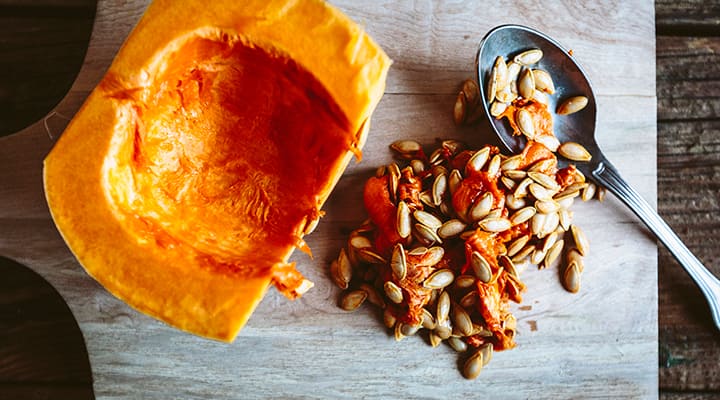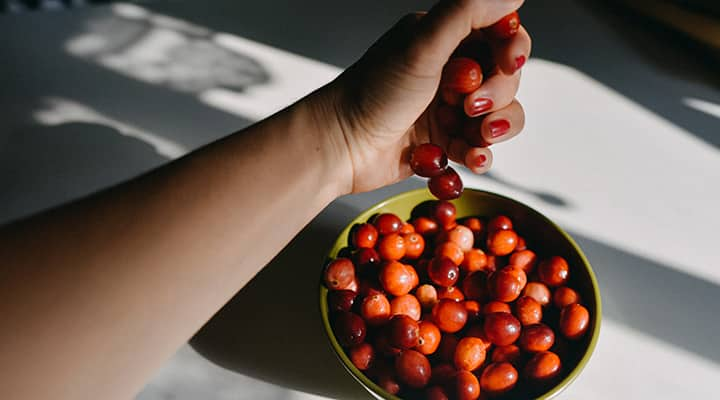
Bathroom Breaks at Night? 8 Nutrients for Your Bladder Health
Published: December 2023
We've all been there—tucked in bed, counting the 76th sheep, when that nagging urge to pee nudges you out of bed.
For many, this is an all too familiar process. Approximately 40 percent of adults get up at night to urinate; within this number, the frequency tends to increase with age.
If you regularly experience nighttime urination, you know it doesn't just disrupt your beauty sleep. It can also impact how rested you feel come morning. Read on to learn about different factors that may be responsible for pee breaks at night, and what you can do to help minimize late-night urination. Ultimately, it all comes down to bladder health, and there are steps you can take to support healthy urinary patterns, day and night!
What do more bathroom trips at night mean?
If you're regularly stirred from sleep to use the bathroom, anything from recent fluid intake, lifestyle habits or health status could be the culprit. For example, guzzling too much water, drinking caffeine late in the day, or enjoying a few glasses of wine before bed can increase the chances you'll wake to urinate. Also, if you habitually wake up at night, your body may be accustomed to this behavior, encouraging restroom use after bedtime.
How many times to urinate in the night is normal?
There isn't a standard "normal" number of times to go to the bathroom. Depending on individual needs, going to the bathroom 5-6 times a day can be considered normal. However, adults older than 60 may use the bathroom 1-2 times at night, depending on their health or bedtime practices.
A recent study found that healthy female volunteers had 2-10 bathroom breaks during the day and went zero to four times at night. A study of men, meanwhile, found that the male volunteers urinated six times during the day, with nearly zero bathroom visits at night. But remember, everyone has a unique biology, so what's normal for you may not be normal for others—and vice versa.
8 nutrients to support bladder health
There's nothing fun about bathroom trips at night, but you can help encourage healthy urinary patterns by being proactive about ensuring you include bladder-friendly nutrients in your diet. These eight nutrients are an excellent place to start.
1. Vitamin D
Vitamin D may get all the attention for its benefits for bone health, mood regulation and immune function, but this nutrient also does wonders for urinary health. In a recent study, higher levels of vitamin D were found to positively impact bladder function.
2. Pygeum extract (Pygeum africanum)
Pygeum is an herbal extract derived from the bark of the African cherry tree. Studies have found the effects of pygeum in promoting urinary health and a healthy frequency. Dietary supplements for the bladder often use this herb as an active ingredient in combination ingredients like beta-sitosterol, lycopene, boron, and melatonin.
3. Pumpkin seeds
Pumpkin seeds are nutrient-dense foods that have been studied for their bladder and urinary health promoting benefits. The seeds contain nutrients including magnesium and zinc, and are well-known for supporting a healthy inflammatory response, which is essential for prostate health. In a study of 60 men over three months, pumpkin seed extract helped support urinary health and frequency. You can enjoy pumpkin seeds mixed in your salad, in granola or on their own, but if you don't love the taste, you can also take a pumpkin seed extract supplement, which will have the added benefit of containing a standardized, studied amount of this nutrient.
4. Lindera
A placebo-controlled, double-blind clinical study of 150 participants suggests that extracts from this evergreen shrub is useful in promoting bladder health when combined with horsetail and three-leaf caper. Speaking of which…
5. Horsetail
Horsetail (Equisetum arvense) may just be getting attention now for its benefits for bladder health when combined with lindera and three-leaf caper. However, this plant, which is related to the fern, has been in traditional use for centuries for bladder and urinary health. In fact, its use dates back to ancient Rome!
6. Three-leaf caper
So what is three-leaf caper, the plant that supports urinary health when combined with lindera and horsetail? Native to India, this bright green plant has a long history of use in the Ayurvedic tradition.
7. Cranberry
You're probably not surprised to see this tart red fruit on this list. After all, cranberry is a darling of the urinary health world, with numerous studies confirming its star power in promoting urinary and bladder health. For instance, an analysis of 10 studies found that cranberry juice and products positively impacted urinary tract health after 12 months. Of course, cranberry juice is high in sugar and calories, which makes a standardized cranberry extract supplement a good option for those watching their waistlines!
8. Hibiscus
Used in herbal drinks, hibiscus can be a delicate flavoring agent. But it's much more than a pretty (and tasty) flower! Hibiscus is known to contain antioxidants and renal benefits. In a survey given to urologists, a combination containing hibiscus extract was found to be effective at promoting bladder and urinary tract health.
What Causes Nighttime Urination?
Nighttime bathroom trips can be a pain, but not every instance of waking up to pee should be a cause for concern. You may feel a need to go if you've had a lot of fluids right before bed, or even if the air-conditioning is cranked too high, causing you to sleep a bit more lightly than usual. Lifestyle habits can also result in nighttime bathroom trips—such as liquor consumption, which can have an impact on urine production.
How can I support healthy urinary frequency?
Like most people, dreamland is the only place you want to visit after getting into bed. If you do find yourself waking up for bathroom trips, here are five tips to help your body get a good night's rest:
- Practice pelvic floor exercises to support bladder health.
- Reduce liquid intake between the late afternoon and evening.
- Be mindful of your salt and protein intake during the latter parts of the day.
- Adopt healthy nutritional habits; that includes complementing balanced meals with dietary supplements that support bladder function and normal urinary patterns.
- Prepare for bed by taking 20-30 minutes to engage in yoga, meditation, breathing exercises, a warm bath, or reading—this will encourage you to sleep more soundly.
About the Author: Beth is a lawyer whose interest in researching health studies sparked a now three-year career in health writing. She has a diverse portfolio, supporting publications and health organizations with articles, blog content, whitepapers, and case studies that reach their target audience. When she's not helping clients connect with customers, she's adding a new book to her unread pile!
References
- Batool M, et al. "Nutritional Value, Phytochemical Potential, and Therapeutic Benefits of Pumpkin (Cucurbita sp.)." Plants (Basel). May 2022. https://www.ncbi.nlm.nih.gov/pmc/articles/PMC9182978/
- Fu Z, et al. "Cranberry Reduces the Risk of Urinary Tract Infection Recurrence in Otherwise Healthy Women: A Systematic Review and Meta-Analysis." J Nutr. December 2017. https://pubmed.ncbi.nlm.nih.gov/29046404/
- Herschorn S, et al. "A population-based study of urinary symptoms and incontinence: the Canadian Urinary Bladder Survey." BJU Int. January 2008. https://pubmed.ncbi.nlm.nih.gov/17908260/
- Jepson RG, Craig JC. "Cranberries for preventing urinary tract infections." Cochrane Library. January 2008. https://www.cochranelibrary.com/cdsr/doi/10.1002/14651858.CD001321.pub4/full
- Leibbrand M, et al. "Effects of an Oil-Free Hydroethanolic Pumpkin Seed Extract on Symptom Frequency and Severity in Men with Benign Prostatic Hyperplasia: A Pilot Study in Humans." J Med Food. June 2019. https://pubmed.ncbi.nlm.nih.gov/31017505/
- Milandri R, et al. "Effects of D-Mannose, Ellirose™ and Lactobacillus Plantarum in treatment of urinary tract recurrent infections (rUTIs): A survey of urologists knowledge about its clinical application." Acta Biomed. March 2020. https://www.ncbi.nlm.nih.gov/pmc/articles/PMC7569579/
- Moan J, et al. "At what time should one go out in the sun?" Adv Exp Med Biol. 2008. https://pubmed.ncbi.nlm.nih.gov/18348449/
- Nishimura M, et al. "Pumpkin Seed Oil Extracted From Cucurbita maxima Improves Urinary Disorder in Human Overactive Bladder." J Tradit Complement Med. January 2014. https://www.ncbi.nlm.nih.gov/pmc/articles/PMC4032845/
- Sandefur CC, Jialal I. "Atrial Natriuretic Peptide." StatPearls. August 2023. https://www.ncbi.nlm.nih.gov/books/NBK562257/
- Schoendorfer N, et al. "Urox containing concentrated extracts of Crataeva nurvala stem bark, Equisetum arvense stem and Lindera aggregata root, in the treatment of symptoms of overactive bladder and urinary incontinence: a phase 2, randomised, double-blind placebo controlled trial." BMC Complement Altern Med. January 2018. https://www.ncbi.nlm.nih.gov/pmc/articles/PMC5793427/
- Wrenn K. "Dysuria, Frequency, and Urgency." National Library of Medicine. 1990. https://www.ncbi.nlm.nih.gov/books/NBK291/
- Wyman JF, et al. "Urination Frequency Ranges in Healthy Women." Nurs Res. September-October 2022. https://pubmed.ncbi.nlm.nih.gov/35319538/
- Zhang Q, et al. "Vitamin D levels and the risk of overactive bladder: a systematic review and meta-analysis." Nutr Rev. May 2023. https://pubmed.ncbi.nlm.nih.gov/37195440/
- "Horsetail." National Library of Medicine. July 2022. https://www.ncbi.nlm.nih.gov/books/NBK583202/
- "Three-leaf caper." Tattva's Herbs. https://www.tattvasherbs.com/three-leaf-caper/










